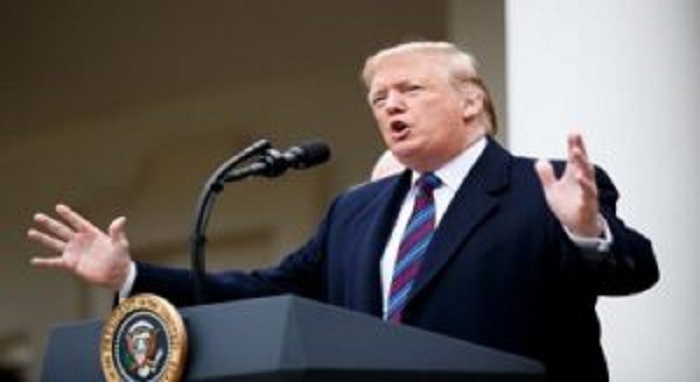Surjit Singh Flora
 (Asian independent) President Donald Trump instructed his economic staff last week to create strategies for applying reciprocal tariffs on any country taxing imports from the United States. Should this approach be used, it might lead to a lot of additional trade disputes as well as significant global instability.
(Asian independent) President Donald Trump instructed his economic staff last week to create strategies for applying reciprocal tariffs on any country taxing imports from the United States. Should this approach be used, it might lead to a lot of additional trade disputes as well as significant global instability.With regard to trade, I have come to the conclusion that, in the spirit of justice, I will impose a reciprocal tariff. This means that we will apply the same tariffs on other nations as we do on the United States, regardless of the duties that other countries impose on the United States. To no less! Never again!! During the course of the election campaign, he made the following promise: “An eye for an eye, a tariff for a tariff, the same amount.” As an example, in the event that India sets a tariff of 25 percent on automobiles manufactured in the United States, the United States government will likewise apply a duty of 25 percent on automobiles imported from India. Trump made the announcement from his position as president of the United States. During the announcement, his body language gave the impression that he considers tariffs to be an essential instrument in the process of negotiation, particularly in this day and age when multilateralism is becoming more prominent.
The retaliatory tariffs that Trump has imposed will also have an effect on India. It is going to be a really difficult challenge for the indigenous sector in India to deal with it. One of the nations that has extremely high tariff rates, India is one of the countries that is particularly sensitive to reciprocal tariffs because of this phenomenon. The newly implemented tax policy in the United States may have an impact on India’s textile, car, and other sectors. In the event that India lowers its tariff rates, it would have an immediate and direct effect on its revenues, which will create a scenario that is very difficult for India’s domestic sector.
According to Trump, these tariffs are a way to promote “fair” trade with both allies and adversaries. However, the reality is that they do not serve the interests of consumers all over the world, and consumers in the United States will also bear the repercussions of these tariffs. On the previous Monday, President Trump made the announcement that domestic imports of steel and aluminium, regardless of the place of origin, would be subject to a duty of 25 percent beginning on March 12th. Prior to the imposition of tariffs, the nations that are responsible for the export of certain metals to the United States will be required to comply with the conditions made by Trump.
Reuters published a study on February 9 that said that since Trump came to power on January 20 and slapped tariffs on Mexico, Canada, and China, the value of the United States dollar has decreased in comparison to other currencies. This suggests that tariffs cannot be considered a successful economic policy. The implementation of tariffs and quotas offers very little value to any of the parties involved; it is quite probable that both nations will suffer adverse effects as a result of these measures. The intensification of trade battles that is now taking place is likely to contribute to the already existing harm. Within the context of the modern global economy, the use of force as a diplomatic instrument is not required.
The implementation of tariffs on steel and aluminium would have repercussions that would be far-reaching. There is little question that the supply chain will be confronted with difficulties, and it is anticipated that the automotive sector will have substantial implications, including an increase in the pricing of vehicles. The recent price rises will have an impact on customers not only in the United States of America but also in a great number of other nations. The persistent dependence of one nation on tariffs as a means of exerting pressure on other nations is becoming a source of worry for all of the parties concerned. Tariffs are a factor that undermines the stability of the global economy.
Although President Trump intends to boost the position of the United States via the implementation of these tariffs, the global economy is closely interwoven. Beyond the borders of the United States, the consequences will have a far-reaching impact, putting the country’s status as a pioneer in international collaboration at risk. Historically seen as a champion of global welfare, the United States of America is now adopting isolationist strategies that have the potential to have a negative impact on the economy of nations that it considers to be competitors.
Although it would seem that the tax of 25 percent on steel and aluminium is largely having an impact on Washington’s old friends, such as the European Union, Canada, Brazil, Mexico, and South Korea, it is possible that China is the true objective of the levy. However, regardless of what it is, it has the potential to bring about the failure of a great number of enterprises in Canada and the loss of thousands of jobs over the next several years. Canada, for instance, is responsible for supplying almost 80 percent of the aluminium that the United States imports. “Together, we can make North America more competitive,” Prime Minister Justin Trudeau, who was representing Canada, said in reference to the comprehensive economic links that exist between the United States and Canada. It would seem that Trump is unaffected by all of this since he has already decided what he considers to be the correct course of action.
As a result of China’s substantial contribution to the manufacture of steel, which accounts for more than fifty percent of the total output worldwide, the nation has established itself as a prominent player in the sector. It would seem that President Trump is targeting Beijing with his tariffs on steel. This is due to the fact that China’s pricing policies discourage American businesses. Nevertheless, the United States might unwittingly boost China’s position by continuously imposing tariffs on its trade partners. This is due to the fact that nations such as Canada, South Korea, Brazil, Mexico, and Vietnam could establish closer relations with China that foster collaboration rather than isolationist measures.
Despite the fact that Trump asserts that these tariffs would result in money from foreign entities, this assertion is not accurate. Importers, and not exporters, are ultimately the ones who are responsible for bearing the expense of tariffs. Despite the fact that exporters may be able to provide some price reductions, the United States has lost its position as the major buyer on a worldwide scale, which makes it hard to achieve significant cost reductions, particularly when other markets are there.
But for how long, the long-term consequences of which might be very negative, and the American consumers will also have to pay for Trump’s tariff-free diplomacy’s penalty. Which Trump is ignoring right now and is resolved to execute his diplomatic activities without considering any of these aspects?









